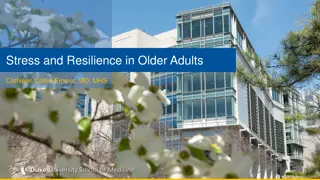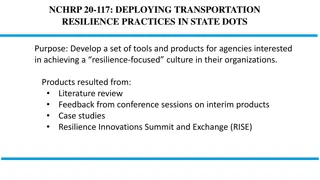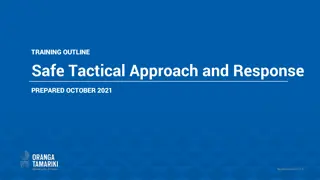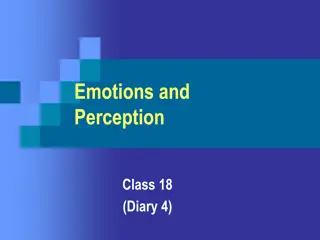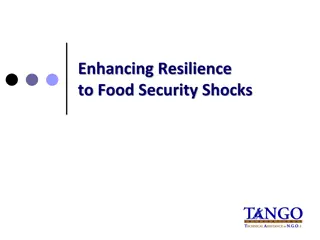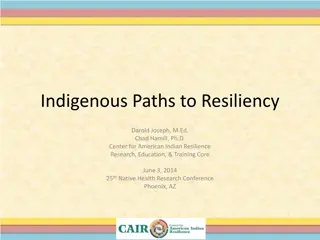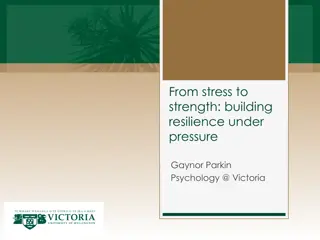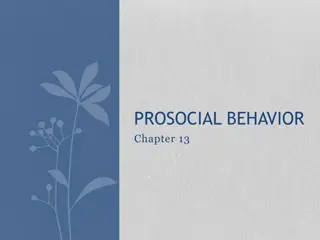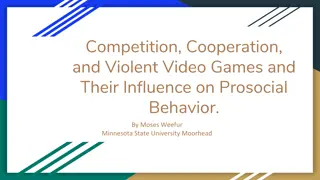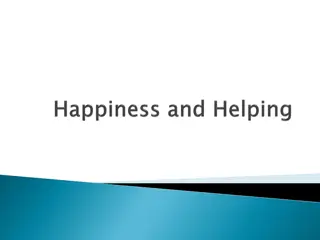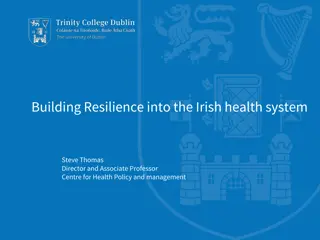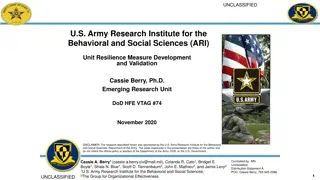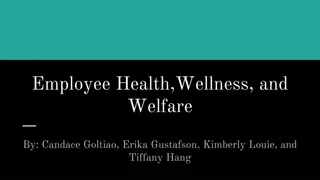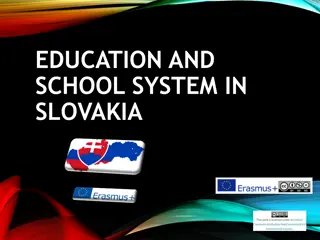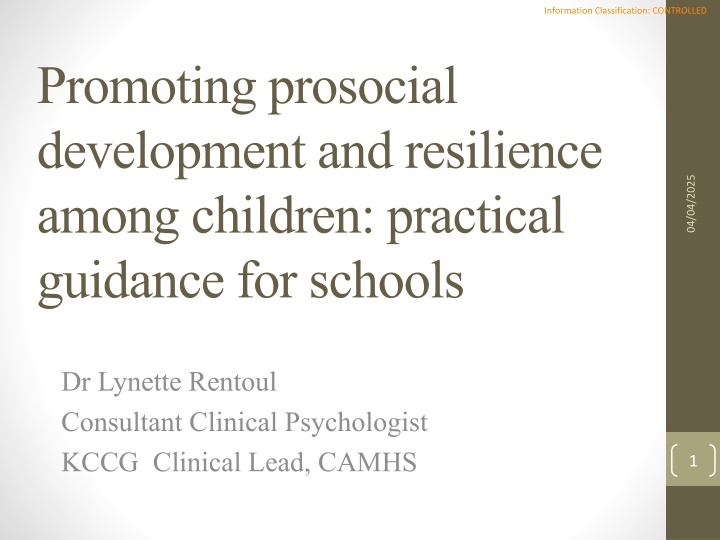
Prosocial Development and Resilience in Children
Learn why understanding prosocial development and resilience in children is crucial for school staff. Discover the impact of communication on child development, the importance of empathy, and the skills that promote positive connections. Enhance your knowledge to effectively support children's emotional and social growth in educational settings.
Download Presentation

Please find below an Image/Link to download the presentation.
The content on the website is provided AS IS for your information and personal use only. It may not be sold, licensed, or shared on other websites without obtaining consent from the author. If you encounter any issues during the download, it is possible that the publisher has removed the file from their server.
You are allowed to download the files provided on this website for personal or commercial use, subject to the condition that they are used lawfully. All files are the property of their respective owners.
The content on the website is provided AS IS for your information and personal use only. It may not be sold, licensed, or shared on other websites without obtaining consent from the author.
E N D
Presentation Transcript
Information Classification: CONTROLLED Promoting prosocial development and resilience among children: practical guidance for schools 04/04/2025 Dr Lynette Rentoul Consultant Clinical Psychologist KCCG Clinical Lead, CAMHS 1
Why understanding prosocial development and resilience in children is important for school staff? When children begin school, they have different: developmental histories and levels of emotional/social development prosocial skills & resilience (emotional and social maturity) Some are very ill-equipped to learn & manage relationships; it may be hard on occasions to grasp significance of this for children Some compromised children may find it very hard to: follow instructions; not know ; not get things right ; concentrate; manage frustrations/disappointments; regulate their emotions; explore new ideas; sustain friendships; prioritise truth in communication. They are more readily overwhelmed by feelings of shame, anxiety or rage which compromises learning & relationships Have problems in sharing, and prioritizing truth in communication School relationships are more likely to be volatile or challenging Effective learning strategies needed to support school inclusion & reduce exclusions, which recognize lack of resilience Problems in relatingunderpin most behavioural challenges Information Classification: CONTROLLED 04/04/2025 2
The social nature of humans: in the words of experts The way we communicate with children has a profound impact on how they develop. Our ability to have sensitive, reciprocal communication nurtures a child s sense of security, and these trusting relationships help children do well in many areas of their lives... Children who have positive connections in life have a source of resilience for dealing with life s challenges. (Siegel, D) Information Classification: CONTROLLED 04/04/2025 It is the need for empathy, the need to be seen, understood and attended to that drives loving connections, which in turn support concern for others and the development of prosocial understanding and skills . (Fonagy, P) Discuss implications of this? 3
Information Classification: CONTROLLED What are prosocial skills? Skills which promote healthy, playful & positive connections They are the basis of the willingness & capacity to trust, share, help, comfort, & support others (& support communication with others) They help us to understand & regulate our emotions (& support our capacity for thinking and reflection) and to: connect to our inner world of thoughts and feelings (our minds) connect with the thoughts and feelings of others (minds of others) They include: Seeing others point of view; Trust others; Tuning into feelings of others; All support reflection & problem Listening and taking turns; Sharing and helping others; Showing concern for others; Putting needs of others above our own when needed; Managing frustration & disappointment; delaying gratification; Children from all cultures have similar forms of prosocial behaviours 04/04/2025 solving skills 4
Information Classification: CONTROLLED How do prosocial skills develop? Foundations laid in early years supported by vital brain development. Understanding these processes informs our strategies for providing reparative interventions. The PACE approach mirrors the principles & practices of healthy early development. Humans are social beings (predisposed to connect with others) Infants predisposed to connect in loving and playful ways But they need sensitive & attuned interactions from start for social & emotional development to take place in healthy ways ( serve and return interactions) Roots of prosocial development lie in being understood , calmed, nurtured & attended to with attunement &empathy not formal teaching. These experiences drive interest in & concern for others Secure Base is vital aspect; who we turn to when distressed -a safe haven to re-experience calm. Revolution in past 30 years in the neuroscience of social & emotional development 04/04/2025s 5
Information Classification: CONTROLLED The neuroscience: some key findings Brains built up over time from bottom up Quality of early relationships affect architecture of brain by establishing either fragile or sturdy foundation for later development The social brain ; brains do not exist in isolation but are linked to the brains of others via mirror neurons . (Parent/child brains) Serve and return relationships are vital for development Young children reach out for interaction in many ways is essential that signs recognized & responded to in attuned & sensitive ways. Flexibility of development decreases with age Easier/more effective to support young brain than rewire later. Brain functions operate in richly co-ordinated ways. Emotional wellbeing & social competence provide strong foundation for emerging cognitive abilities, curiosity and joy in exploring. Toxic stress damages developing brain architecture Unrelenting stress compromises all aspects of social, emotional & cognitive development in children (see ACES research). 04/04/2025 6
Information Classification: CONTROLLED Prosocial development in middle childhood Resilient children are more able to regulate emotions but need adult help to co-regulate feelings at times of distress Children with compromised history struggle to regulate emotions Important developments in how language is used Gradual shift from using language to keep safe (get what you want, keep out of trouble) to prioritizing truth Requires fair/trusted adults, who explain why truth important Children with poor prosocial skills, who live under cloud of shame and lack resilience find this shift challenging Sharing and co-operating with groups develops with support Children with compromised history have different experience of sharing or helping; history of harm leaves children concerned about getting their fair share undermines sharing Children develop capacity to see things from others viewpoint empathy for others show concern; can help others when distressed Children with compromised development find it difficult to see other viewpoints. They fear their needs will remain unseen 04/04/2025 7
Information Classification: CONTROLLED Children with prosocial skills can: Identify, understand and regulate their own emotions Be aware of viewpoint and feelings of others Manage disappointment and frustration; delay gratification Recognize others feelings and have empathy for them Share, co-operate with, and help other children Put needs of others first when required to do so Reflect upon feelings, friendships and situations Develop skills to manage conflict & difference in relationships Respond flexibly to changing circumstances Enjoy exploration and tolerate not knowing and making mistakes as part of discovery/learning Take turns and follow instructions Develop and enjoy positive relationships with peers & teachers Develop good coping skills Develop good problem-solving skills and capacity for thinking and reflection supports all aspects of learning 04/04/2025 8
Promoting prosocial development in children: research evidence Don t use rewards and consequences to promote prosocial values and behaviour; see them as good in own right Be aware of child s capacity for empathy and sympathy Heighten the child s awareness of the emotions of others Point out consequences of actions and impact on others Be supportive and sensitive to child's needs Be warm and support the regulations of child s emotions Support child s skill to manage/ regulate their own emotions Support problem solving skills Minimize punishment; maximize support and encouragement Support opportunities to give and support others Help child develop a sense of themselves as prosocial: kind, helpful, thoughtful, and able to share and take turns and recognize needs of others Information Classification: CONTROLLED 04/04/2025 9
Information Classification: CONTROLLED What is resilience in children? Resilience is not an inherent characteristic of the child, rather it is something that is embedded in relationships. Capacity to adapt well to adversity, threats and challenges, to problem solve and maintain a sense of hope and optimism. Resilience requires wide range of prosocial skills. Resilience reflects the balancing of contradictory forces of challenges (threats) and protective factors (loving and helpful relationships with trusted adults and problem solving skills). Stable and responsive relationships early in life help protect children from the harm of excessive threat (throughout life). Ongoing adversity in early life (toxic stress) makes our bodies more susceptible to the negative impact of stress throughout life (less resilient) has long-term consequences for health, learning, social relationships and contentment. 04/04/2025 10
Information Classification: CONTROLLED Resilience is capacity to find balance between protective factors and adversity 04/04/2025 11
Information Classification: CONTROLLED Supporting resilience in children The single most common factor for children who develop resilience is at least one stable and committed relationship with a supportive parent, caregiver, or other adult. These relationships provide the personalized responsiveness, scaffolding, and protection that buffer children from developmental disruption. They also build key capacities such as the ability to plan, monitor, and regulate feelings and behaviour that enable children to respond adaptively to adversity and thrive. This combination of supportive relationships, adaptive skill-building and positive experiences is the foundation of resilience . (Harvard Child Development Centre) 04/04/2025 12
Information Classification: CONTROLLED What resilient children are able to do Describe and regulate their emotions Manage challenges, frustrations, and disappointments Be persistent, especially in the face of obstacles Meet challenges of learning, playing and relationships Problem-solve and take actions to deal with challenges Seek help and support from trusted adults when needed Know when to stop, rest, and replenish resources Have a sense of independence, self-efficacy and worth Form and enjoy positive relationships Have sense of purpose and goals Be hopeful & optimistic (belief things will turn out alright ) Feel gratitude about the good things in life and supportive relationships; prioritise truth in trusting relationships 04/04/2025 13
Information Classification: CONTROLLED Factors that support resilience Supportive & loving relationships/ connections with parents and trusted emotionally available adults; enjoy friendships. Ability to trust helpful adults and seek help when needed Secure base; stable and safe environments (reduces stress). A sense of self-efficacy and control and coping, problem solving and life skills; can manage challenges & frustrations Opportunities to strengthen adaptive skills; persistence Recognizing and regulating emotions; know when to rest. Ability to have a go (even if this risks getting it wrong) Embracing new experiences in flexible ways Hopeful and optimistic outlook; sense of purpose & worth Positive experiences, access to adults who model resilient skills (calm, flexible and problem-solving approach) See wonder in the natural world and enjoy being outdoors 04/04/2025 14
Information Classification: CONTROLLED Adversities: risk factors that threaten resilience Challenges that threaten to overwhelm child (for example): Bullying; exam pressures; isolation and lack of connection health threats to child or family members environmental disasters; threats to public health Adverse life experiences (for example): physical, sexual and emotional harm to children parental conflict and domestic violence parental drug and alcohol misuse or mental health problems marked poverty and deprivation Bereavement; parental separation; Trauma ACES research (part of TIS approach in Cornwall schools) With 3 ACES 3x as likely to experience academic failure; 5x attendance problems; 6x behaviour and relationship problems. With 4 ACES 50% children had learning problems, and were 32 times more likely to have relationship/behavioural problems 04/04/2025 15
Information Classification: CONTROLLED Building resilience in children Build strong social and emotional connections and attunement Develop facilitating relationships to support children s problem solving, flexibility and sense of self-efficacy Connect before you correct (Dan Hughes) Help children identify, describe and regulate their emotions Enjoy process of learning and discovery, rather than focus on answers making errors is part of learning Support growing independence, self-efficacy and problem solving Build children s confidence by taking on manageable challenges Promote optimism, playfulness; seeing the bright side of things Promote and demonstrate coping skills. Give children ideas Help children face frustration, disappointment and the need to delay gratification when required to do so Make sure children get enough sleep, outdoor exercise and opportunities to connect with the outside world 04/04/2025 16
Information Classification: CONTROLLED Impact of poorly developed prosocial skills Impact of compromised development Realm of development Emotional development Poor emotion identification and regulation Frequent dysregulated and distressed states Difficulty in managing disappointment and frustration Experiencing high levels of negative emotions (that threaten emotional wellbeing and mental health) Readily overwhelmed by hurdles and challenges Insecure attachments (avoidant or ambivalent) Insecure/volatile relationships; disconnected Not able to trust or seek help from trusted adults Difficulty in seeing other points of view Poor capacity for empathic understanding Harm to self/other or property; limited coping skills Friendship problems; Poor turn taking and sharing skills Impaired capacity for reflection and thinking Concentration and organizational difficulties Fear of not knowing or getting things wrong Failure to connect with the process of learning Limited coping and problem-solving skills; lack of flexibility 04/04/2025 Social development Cognitive and educational development 17
Information Classification: CONTROLLED Spotting the warning signs Frequent emotionally dysregulated states rage; distress; sadness; anxiety Struggles with friendships/relationships; frequent conflict Struggles with managing frustration and disappointment Difficulty trusting children and adults in school Uses language in less mature and defensive ways to shore up low self-esteem and anxiety (can t prioritise truth) Difficulty in turn-taking and sharing Struggles to enjoy friendships in playful ways; conflict Struggles to engage in learning e.g. fears getting things wrong; lack of flexibility; fears uncertainty Easily overwhelmed by feelings of shame and anxiety Marked difficulties in organizing and initiating work Highly distractible; poor levels of concentration need support to remain on task 04/04/2025 18
Supporting children who lack resilience: using the PACE approach Information Classification: CONTROLLED The PACE Approach (Dan Hughes): evidence-based reparative approach to support children who lack resilience Mirrors essentials of early relationships (& therapeutic ones) Emphasizes importance of attunement, intersubjectivity, calming and emotion regulation through an approach, which draws upon Playfulness; Curiosity; Empathy; Acceptance Playfulness and joy are at the heart of healthy relationships Acceptance by recognizing and accepting child s struggles Curiosityis a state of mind, desire to understand child s struggles and convey to child an interest in understanding Empathy underpins quality of connection with the child. The PACE approach underscores the importance of connecting with the child, seeing their struggles from their point of view, and conveying something is understood. 04/04/2025 19
Information Classification: CONTROLLED What you notice What you can do in schools: using PACE approach Child becomes distressed or angry in face of ordinary challenge Tune in to child s struggles and name them for child as first step to convey understanding Support emotion regulation by calming child (co- regulation). Help child makes sense of feelings. Support thinking and reflection when child is calmer Support problem solving skills 04/04/2025 Child struggles with friendships and working with other children Name and describe child s struggles in empathic ways Help child to work with other children e.g. plan activities that require children to share and help each other to reach common goal (like treasure hunt) When child struggles to manage conflict, help the child see things from other viewpoints; and help child understand how our actions affect others; praise child when helpful Praise child when they share, take turns and listen to others Child struggles with learning Notice and describe the struggles the child is experiencing Be aware the child is likely to be overwhelmed with shame Help the child problem solve; encourage flexibility Focus on the process and how it can be enjoyed, rather than getting the answer right or wrong; help child see that getting things wrong is simply a part of learning 20
Information Classification: CONTROLLED Promoting resilience in schools Do Differentiate support approaches for children who lack resilience Be calm, notice and name child s difficulties. Support coping. Help calm child, co-regulation of strong emotions supports thinking Connect with the child and convey struggles are understood (use PACE) before correcting. Recognize the child may have limited prosocial skills; support child s ability to work and play with children (turn taking/sharing) Set manageable challenges; have realistic expectations (learning and social); child may feel shame if facing tasks they can t do. Help children have a go Don t Expect child to manage things beyond them shame is common emotion among children who lack resilience (learning and social) Focus only on bad behaviour, rather than the feelings and relationships that underpin child s struggles. Point out child s mistakes in front of other children if avoidable. Insist the child looks at you when correcting for mistakes (shaming). Assume child is resilient or can manage tasks normally expected of age group (pockets of immaturity). Assume child possesses appropriate prosocial skills e.g. importance of using language to convey truth; ability to see others viewpoint 04/04/2025 21
Information Classification: CONTROLLED Key things to remember: It does not take something extraordinary to thrive against the odds. We need to build resilience through everyday loving connections, attunement and support from caring adults. Resilience, far from being exceptional, is common among children and families the ordinary magic of resilience (Masters, A). Human brains are malleable; this malleability is greatest in early childhood. So the earlier we start strengthening the child s prosocial skills and ability to cope with challenges, the better. Human resilience is an ongoing process supported by loving relationships; it is neither a fixed point nor inherent quality. Learning to cope with manageable challenges and threats to our wellbeing is critical for the development of resilience. Resilience can fluctuate over time and different circumstances; a child may struggle in one domain but adapt well in others. Their resilience can be greater or lesser at different points in time. 04/04/2025 22



